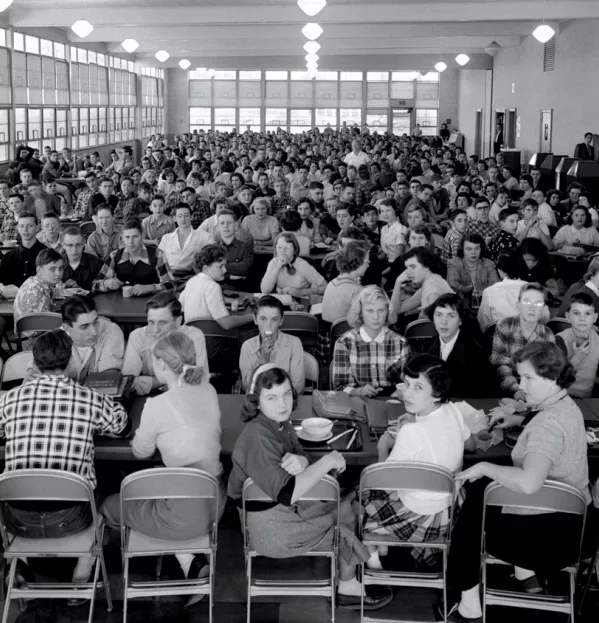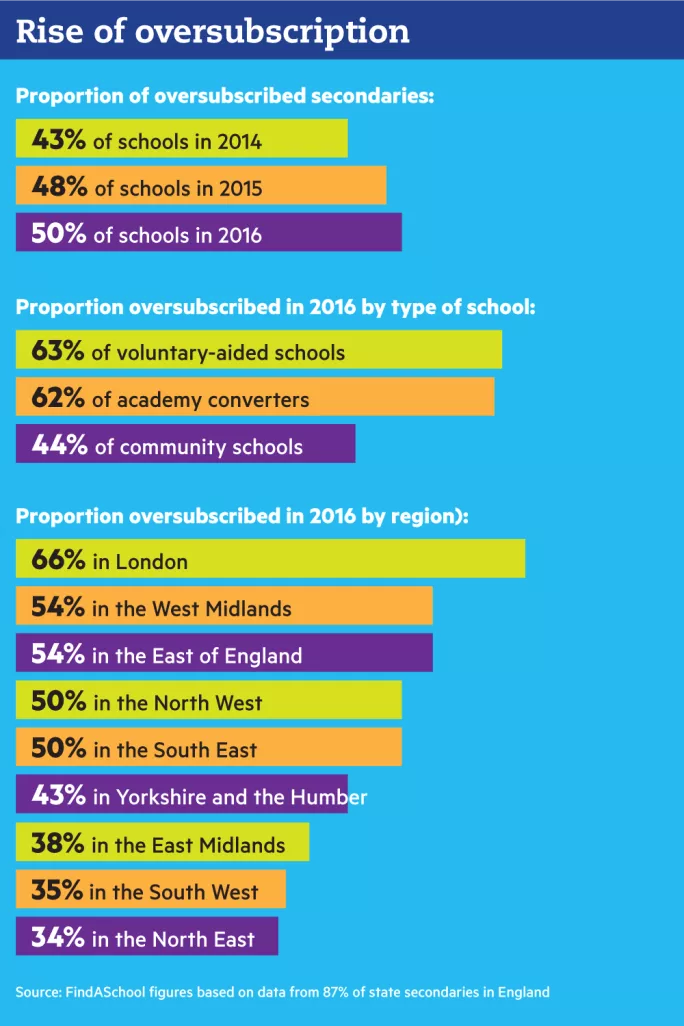Secondaries ‘crippled’ as half are oversubscribed

At least half of England’s secondaries are now oversubscribed, according to exclusive research seen by TES, causing headteachers to warn of the “crippling” impact of popularity on their schools.
The proportion of secondaries with more applications than pupil places rose to 50 per cent this year for the first time in a generation, figures from the FindASchool website show.
And the rate - which stood at just 43 per cent two years ago - is expected to get worse still, due to the bulge in secondary pupil numbers over the next five years.
Headteachers are already complaining of the “struggle” that schools face because of oversubscription. Challenges include:
- A lack of money to cover the costs of taking on additional pupils.
- Staff having to spend up to three weeks out of school to deal with appeals during the crucial run-up to exams.
- Difficulties in recruiting extra teachers in core subjects.
- The need to sacrifice staffrooms and office space to make room for extra classes.
Rob McDonough, headteacher of the West Bridgford School in Nottinghamshire, told TES that the costs of being oversubscribed were “extraordinary” (see “Schools want to expand” box, below). “What’s crippling me is funding the pupil expansion,” he said. “That’s worrying me now because [the reserves are] gone.”
The FindASchool study analysed the admissions arrangements of 87 per cent of England’s state secondaries.
Data is still missing from some schools that control their own admissions, but the researchers expect the proportion of oversubscribed institutions to rise above 50 per cent when all the figures are in. And they say that changing demographics will worsen the situation for secondaries in the future.
Ed Rushton, founder of FindASchool - a school-checking service run with 192.com - said: “Our figures, which, incidentally, the government does not collect, suggest the problem is getting worse.
“Given the large bulge in primary school numbers, this trend is likely to continue unless lots of extra schools are opened and more school places are added where they are most needed.
“Over the next five years, there will be more of a crunch because of the bulge. I would say it is likely that this is the first time it has gone above 50 per cent.”
The analysis reveals that the problem is most acute in London, where two-thirds of secondaries are oversubscribed. But the difficulties extend nationwide, with at least half of secondaries oversubscribed in the West Midlands, East of England, the North West and the South East.
Need for ‘strategic overview’
Malcolm Trobe, interim general secretary of the Association of School and College Leaders, said a more strategic approach was needed to provide sufficient school places.
“The overall planning has never been brilliant in getting the right number of school places in the right place at the right time,” he said. “There tends to be a time lag between the youngsters coming in and the provision of school places.
“Schools often cannot quickly expand to deal with an increase in numbers. There needs to be a strategic overview in local areas to ensure there are sufficient places.”
He added that this planning needed to happen “in advance so you are not bringing mobile classrooms into schools at the last minute”.

Dealing with appeals for places has become another significant problem for schools, alongside building work, squeezed budgets and staff shortages.
Burnt Mill Academy, in Harlow, Essex, had more than 100 children on its waiting list last year and receives about 40 appeals annually.
John Blaney, headteacher, said: “It could be a whole week in May when we are expected to be out of school. It is already a very busy time to be away from school. It’s a struggle.”
Last month, new government statistics revealed that there were 62,301 appeals made by parents in 2016, compared with 54,600 the year before - a rise of 14 per cent.
Mr Trobe said some schools had to attend more than 100 appeal hearings a year.
“It is very nice to be popular, but dealing with the appeals is quite a difficult situation to handle,” he said. “There needs to be more of a triage system in order to reduce the timeconsuming nature of the system.”
A Department for Education spokesman said: “We are delivering good-quality school places to ensure that every child has an excellent education that allows them to reach their full potential.
“Our latest data shows that nearly 600,000 additional pupil places were created between May 2010 and May 2015, and we are investing £7 billion in new places up to 2021.
“Thanks to that hard work and investment, 1.4 million more pupils are now in good or outstanding schools than in 2010.”
You need a Tes subscription to read this article
Subscribe now to read this article and get other subscriber-only content:
- Unlimited access to all Tes magazine content
- Exclusive subscriber-only stories
- Award-winning email newsletters
Already a subscriber? Log in
You need a subscription to read this article
Subscribe now to read this article and get other subscriber-only content, including:
- Unlimited access to all Tes magazine content
- Exclusive subscriber-only stories
- Award-winning email newsletters